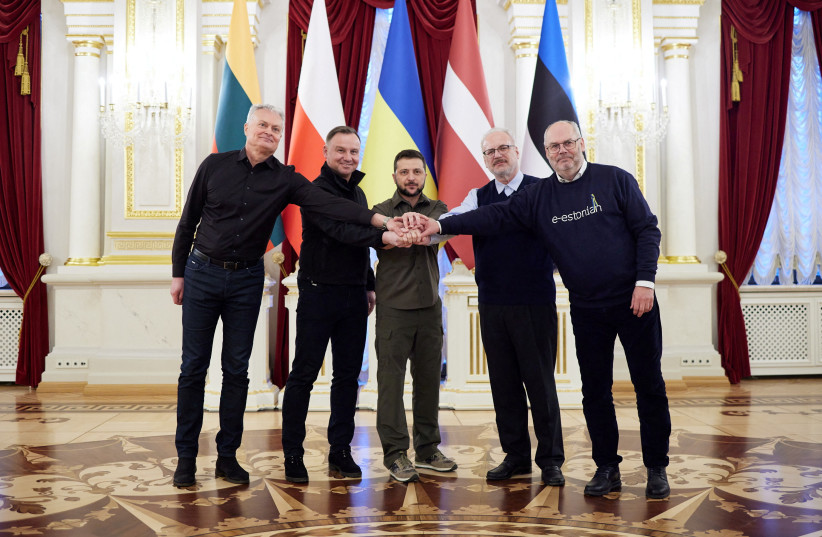Latvian President Egils Levits is currently in Israel to mark the 30th anniversary year of Latvian-Israeli diplomatic ties.
Israel and Latvia established diplomatic relations in January 1992, soon after the North European Baltic country won its independence from the former Soviet Union.
Levits is one of three current heads of state who are of known Jewish descent. The other two are Ukrainian President Volodymyr Zelensky and Israel’s President Isaac Herzog, who together with his wife, Michal, received Levits, his wife, Andra, and their large business delegation on Monday, in a state ceremony at the President’s Residence in Jerusalem.
A lawyer and political scientist by profession, Levits was a member of the European Court of Justice from 2004 until 2019, when he was elected to his present position. Herzog is also a lawyer by profession, so the two presidents immediately found a common language in addition to several other issues they discussed.
Levits and his parents were prominent among Soviet dissidents during the Communist era and were expelled from Latvia. They moved to Germany, where he continued with his tertiary education. He was later active in the struggle to restore Latvian independence, which was regained in 1990.

Since then, he has served as vice prime minister and minister of justice, and has held ambassadorships in Hungary, Austria and Switzerland. In 1995, Levits was appointed a judge in the European Court of Human Rights, a position he held until 2004. He was reappointed in 2018, but had to cede that honor once he became his country’s president.
His multi-lingual wife, Andra, is a certified specialist in pediatric and adolescent gynecology, as well as a certified obstetrician and ultrasonography specialist.
Enhancing relations between Israel and Latvia
In a wide-ranging conversation, the two presidents emphasized the desire on the part of both countries to enhance their relations. Herzog welcomed his guest in somewhat halting Latvian, which judging by the pleased grin on the face of the Latvian president, was a much-appreciated gesture.
“Did I do it right?” asked Herzog as he switched to English.
Levits confirmed that he had.
Herzog, whose family has multi geographical roots, mentioned that his paternal grandmother, Sarah Herzog, was born in Latvia’s capital Riga.
In a broad ranging discussion, they spoke about Latvia’s Jewish community; the signing into law by Latvia of its restitution of Jewish property law (Compensation of Goodwill to the Latvian Jewish Community); their aim to improve trade, commerce, scientific cooperation, academic relations and the number of flights per week between the two countries; humanitarian aid for Ukraine; the pervasive danger of Iran; presidential powers or lack thereof; and more.
Although this is his first official visit to Israel – which is about a third the size of Latvia but has about five times the population – it is not his first experience of the country, Levits disclosed. His previous visit a few years back was as a tourist, when he hired a car and drove around exploring.
During this visit, he had hoped to sign Latvia’s first-ever dual national agreement whereby Latvian immigrants to Israel could have both Israeli and Latvian citizenship. However, there was a technical hitch in that Israel has not yet formed a government, and such an agreement has to be signed by a regular government, not an interim one.
Similarly, Latvia, which in principle has agreed to become part of the International Holocaust Remembrance Alliance, cannot do so until it forms a government, following its parliamentary elections in October, but this is less of a problem than it is in Israel.
As for the Latvian Jewish community, Levits said it goes back to the 16th century, which consistently flourished until the late 19th and 20th centuries. During the Holocaust, 90% of Latvian Jews were murdered. Today there are approximately 8,000 Jews in Latvia, with two Jewish schools – one public and the other private – and the community, according to Levits, is active and vibrant.
Herzog mentioned two noted Latvian Jews who had migrated to Israel: Mordechaai Nurock, who had served in both the Latvian and Israeli parliaments, and Moshe Arens, who had served as both foreign minister and defense minister of Israel. Nurock, who had headed the minority bloc in the Latvian Parliament, was subsequently elected to the first Knesset, and was Israel’s first postal services minister.
Levits invited Herzog to visit Latvia, and the Israeli president expressed his desire to see the places of his grandmother’s childhood.
The Latvian president and his wife returned to the President’s Residence on Monday evening for a state dinner, hosted by the Herzogs in their honor.
